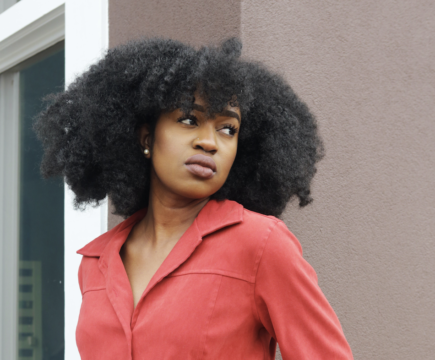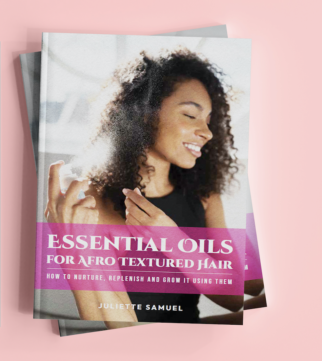Essential Oils and natural hair care? Welcome to your journey towards beautiful, and healthy natural hair.
If you’ve ever felt frustrated with your hair’s lackluster appearance or struggled to maintain its natural beauty, you’re not alone. I’ve been there. So has anyone else who wears their hair in a natural style.
Picture this: You wake up, and feel an immediate boost of confidence as your strands look healthy and moisturized. In this guide, I’ll share with you myths, maintenance tips and Q & A’s, along with a foolproof plan to unlock the full potential of your hair using essential oils.
Why listen to me? Well, between countless hours of researching And experimenting with my natural hair care methods, there are a few things I can talk about. Get ready to bid farewell to hair woes and hello to a head-turning gorgeous natural hair!
The Myths About Essential Oils and Natural Hair Care
Forget everything you thought you knew about hair care. Society and the industry have led you astray with misconceptions galore. From the belief that natural hair can’t be managed to the notion that only expensive products yield results, it’s time to debunk these myths once and for all.
5 Common Myths About Natural Hair
Myth #1: Natural Hair is Unmanageable
Contrary to popular belief, natural hair is incredibly versatile and manageable with the right care routine. By understanding your hair’s unique needs and using the appropriate products and techniques, you can achieve stunning results.
Myth #2: Only Expensive Products Work
Price tags don’t determine effectiveness. Many affordable, natural products can nourish and enhance natural hair just as effectively as high-end brands. It’s all about finding what works best for your hair type and texture.
Myth #3: Natural Hair Doesn’t Grow
Natural hair growth is a process that requires patience and proper care. With consistent nurturing and attention to scalp health, natural hair can grow long and healthy. Essential oils like rosemary, peppermint and tea tree can even stimulate hair growth, debunking this myth.
Myth #4: Heat is Necessary for Styling Natural Hair
Excessive heat styling can lead to damage and breakage, especially for natural hair. Contrary to popular belief, there are numerous heat-free styling methods that can achieve beautiful, versatile looks while maintaining the health of your hair.
Myth #5: Natural Hair Can’t Be Professional
Natural hair is professional and beautiful in any setting. Embracing your natural texture demonstrates confidence and authenticity, qualities that are highly valued in professional environments. With the right styling techniques, natural hair can be styled elegantly for any occasion.
THE MECHANICS and MAINTENANCE – How To Care For Your Natural Hair Using Essential Oils
Let’s dive into the nitty-gritty of transforming your hair naturally. Step by step, I’ll guide you through a proven process that’s bound to leave you amazed. From selecting the right essential oils to mastering application techniques, we’ll cover it all.
Each step isn’t just about actions; it’s about the transformation you’ll experience. Imagine feeling the weight lifted off your shoulders as you bid farewell to frizz and hello to silky smooth strands. With each application, you’re one step closer to hair that radiates health and vitality.
Caring for your natural hair using essential oils is a game-changer in achieving healthy, vibrant locks.
Here’s a Simple Guide to Help You Harness the Power of Essential Oils for Optimal Hair Care:
Understand Your Hair Type and Needs:
Before diving into essential oils, it’s crucial to understand your hair type and its unique needs. Whether you have curly, coily, or wavy hair, knowing your hair’s characteristics will guide you in selecting the right oils and crafting a personalized care routine.
Choose the Right Essential Oils:
Essential oils offer a myriad of benefits for hair health, from promoting growth to nourishing your scalp. Two powerhouse oils for natural hair care are peppermint and tea tree oil. Peppermint oil stimulates blood flow to the scalp, promoting hair growth, while tea tree oil possesses antibacterial properties that soothe and cleanse the scalp, combating dandruff and itchiness.
Dilute Properly:
Essential oils are potent and should always be diluted before applying to the hair and scalp. Starting with one or two drops of your chosen essential oil with a carrier oil, such as coconut, jojoba, or olive oil, can help you create a safe and effective solution.
Massage into the Scalp:
Gently massage the diluted essential oil mixture into your scalp using your fingertips. This stimulates circulation, encourages hair growth, and nourishes the hair follicles. Focus on areas prone to dryness or irritation for maximum benefit.
Apply to the Length of Your Hair:
After treating the scalp, distribute the remaining oil along the length of your hair. This helps hydrate and condition your hair strands, preventing breakage and promoting shine. Pay extra attention to any dry or damaged areas for targeted nourishment.
Leave-In or Rinse Out:
Depending on your preference and hair needs, you can choose to leave the oil mixture in as a nourishing treatment or rinse it out after a designated period. Leaving the oils in overnight can provide deep hydration and repair, while rinsing them out after a few hours allows for a lighter, non-greasy finish.
Incorporate into Your Hair Care Routine:
Consistency is key when using essential oils for natural hair care. Incorporate them into your regular hair care routine by applying them 1-2 times per week or as needed. Over time, you’ll notice improvements in hair texture, moisture retention, and overall health.
Monitor Your Hair’s Response:
Pay attention to how your hair responds to essential oils and adjust your routine accordingly. If you experience any irritation or sensitivity, discontinue use and try a different oil or dilution ratio. Every individual’s hair is unique, so finding the right balance is essential.
By following these simple steps and incorporating essential oils into your natural hair care regimen, you’ll unlock the secret to healthy, radiant hair from root to tip. Say hello to nourished strands, a happy scalp, and hair that shines with vitality!
Questions About Essential Oils and Natural Hair Care?
Questions swirling around in your mind? Let’s tackle them head-on. Whether it’s clarifying the application process or addressing concerns about essential oil safety, I’m here to provide clarity every step of the way.
Here Are 5 of The Most Commonly Asked Questions about essential oils and natural hair:
Question #1: Can essential oils help with hair growth?
Many people wonder whether essential oils have the potential to stimulate hair growth. Peppermint oil, for example, is known for its ability to increase blood flow to the scalp, which can promote hair growth. Tea tree oil also supports a healthy scalp environment, which is essential for optimal hair growth. Incorporating peppermint and tea tree together into your routine is a game-changer for achieving your hair goals.
Why peppermint and tea tree oils? These powerhouses boast a myriad of benefits, from promoting hair growth to soothing irritated scalps.
Rosemary essential oil is another oil that’s known to help with hair growth challenges. From circulation to antioxidants, rosemary oils has its place in the world of natural hair growth and maintenance.
Question #2: How should I dilute essential oils for safe use on my hair?
Dilution is crucial when using essential oils to avoid skin irritation or sensitivity. Most experts recommend diluting essential oils with a carrier oil, such as coconut, jojoba, or olive oil, before applying them to the hair and scalp. A common dilution ratio is a few drops of essential oil per tablespoon of carrier oil.
Question #3: Can essential oils help with dandruff and scalp irritation?
Essential oils like tea tree oil possess antimicrobial and anti-inflammatory properties that can help combat dandruff and soothe scalp irritation. When used in combination with a carrier oil and massaged into the scalp, tea tree oil can help alleviate symptoms of dandruff and promote a healthier scalp environment.
Question #4: Are there any essential oils I should avoid for natural hair?
While many essential oils offer benefits for hair health, some may be too harsh or irritating for certain individuals. It’s essential to patch test any new essential oils before applying them to the scalp or hair to ensure there are no adverse reactions. Additionally, pregnant or nursing individuals should consult with a healthcare professional before using essential oils.
Question #5: How often should I use essential oils in my natural hair care routine?
The frequency of essential oil use depends on individual hair needs and preferences. Some people may benefit from using essential oils as a weekly treatment, while others may choose to incorporate them into their routine more or less frequently. It’s essential to listen to your hair and adjust your usage accordingly to avoid overloading or drying out the hair and scalp.
Summing Things Up …
Caring for your natural hair using essential oils is a journey filled with discovery and transformation. By understanding your hair’s needs, selecting the right oils, and crafting a personalized care routine, you can unlock the full potential of your locks. Here’s a quick summary of what we’ve covered:
– Understanding Your Hair: Before diving into essential oils, it’s essential to know your hair type and its unique requirements. Whether you have curly, coily, or wavy hair, tailoring your approach ensures optimal results.
-Choosing the Right Oils: Peppermint and tea tree oil stand out as potent options for natural hair care. Peppermint oil boosts circulation and promotes growth, while tea tree oil soothes the scalp and combats dandruff.
-Proper Dilution and Application: Dilute essential oils with carrier oils and massage them into your scalp to stimulate growth and nourish follicles. Distribute the remaining mixture along the length of your hair for added hydration and shine.
-Incorporating Into Your Routine: Consistency is key when using essential oils. Integrate them into your regular hair care regimen 1-2 times per week or as needed to see lasting improvements in texture and health.
-Monitoring Your Hair’s Response: Pay attention to how your hair reacts to essential oils and adjust your routine accordingly. If irritation occurs, discontinue use and explore alternative options to find what works best for you.
By following these steps and addressing common concerns about essential oils and natural hair, you’re well-equipped to embark on your hair care journey with confidence. Say goodbye to hair woes and hello to a mane that radiates health, vitality, and natural beauty!
That’s it for this week. As always …
Dedicated to Your Beauty,
Juliette Samuel,
Esthetician/Author/Publisher,





 Facebook
Facebook Twitter
Twitter Delicious
Delicious Digg
Digg Myspace
Myspace StumbleUpon
StumbleUpon Youtube
Youtube